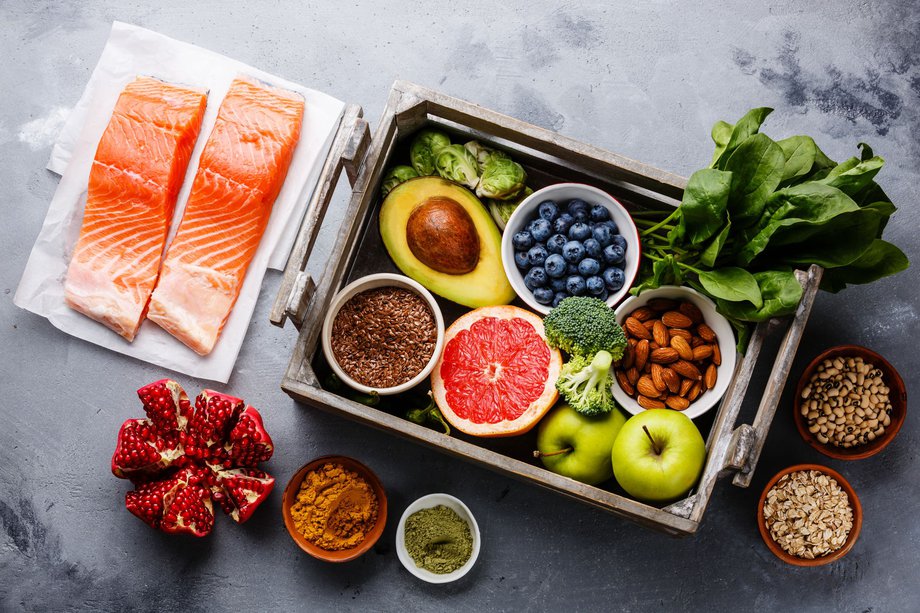What Are The Best Foods To Eat For Hypertension Control?

Hypertension, also known as high blood pressure, is a chronic medical condition that affects a significant proportion of the global population. It is a major risk factor for cardiovascular diseases and is associated with various adverse health outcomes.
Lifestyle modifications, including dietary changes, are a crucial component of the management and control of hypertension. This article aims to provide an overview of the best foods to incorporate into the diet for hypertension control. The recommendations are based on scientific evidence and guidelines from reputable health organizations.
Specifically, this article will discuss the importance of including fruits and vegetables rich in potassium, choosing whole grains over refined carbohydrates, incorporating lean protein sources, limiting sodium intake, increasing consumption of foods high in magnesium, opting for low-fat dairy products, emphasizing the importance of fiber, and being mindful of alcohol consumption.
By following these dietary guidelines, individuals with hypertension can potentially reduce their blood pressure levels and improve their overall cardiovascular health.
Key Takeaways
- Potassium-rich foods like bananas, oranges, spinach, and avocados counterbalance the effects of sodium and lower blood pressure.
- Whole grains offer benefits like fiber content, nutrient density, lower glycemic index, and reduced inflammation for hypertension control.
- Lean protein sources like skinless poultry, fish, beans, lentils, and low-fat dairy products have beneficial effects on blood pressure management.
- Restricting sodium intake is essential for managing high blood pressure.
Incorporate Fruits and Vegetables Rich in Potassium
Incorporating fruits and vegetables that are high in potassium into your diet is a recommended strategy for maintaining blood pressure control. Potassium is an essential mineral that plays a crucial role in regulating blood pressure levels. Consuming foods such as bananas, oranges, spinach, and avocados can provide a significant amount of potassium.
Including these potassium-rich foods in your meals can help lower blood pressure by counterbalancing the effects of sodium, a mineral that can increase blood pressure. Additionally, following a high potassium diet has been associated with several benefits, including reduced risk of stroke, improved cardiovascular health, and lower blood pressure levels.
To incorporate more potassium into your diet, you can explore various potassium-rich recipes that include ingredients like sweet potatoes, tomatoes, and yogurt. By prioritizing potassium-rich fruits and vegetables, you can effectively manage hypertension and promote overall health.
Choose Whole Grains Over Refined Carbohydrates
Opting for whole grains rather than refined carbohydrates is recommended for managing high blood pressure. Whole grains offer numerous benefits that can help control hypertension. Here are four reasons why choosing whole grains is beneficial:
- Fiber content: Whole grains are rich in dietary fiber, which has been shown to lower blood pressure levels. Fiber helps regulate blood sugar levels and promotes a feeling of fullness, reducing the risk of overeating.
- Nutrient density: Whole grains contain a wide range of essential nutrients, including vitamins, minerals, and antioxidants. These nutrients contribute to overall cardiovascular health and may help lower blood pressure.
- Lower glycemic index: Whole grains have a lower glycemic index compared to refined carbohydrates, meaning they cause a slower and more gradual rise in blood sugar levels. This can help prevent insulin resistance and reduce the risk of developing hypertension.
- Reduced inflammation: Whole grains have been associated with lower levels of inflammation in the body. Chronic inflammation is linked to various health issues, including high blood pressure.
In contrast, consuming refined carbohydrates can have negative consequences for hypertension control. Refined carbs, such as white bread and sugary snacks, are often stripped of their fiber and nutrients, leading to a rapid spike in blood sugar levels and increased risk of developing hypertension.
Therefore, incorporating whole grains into the diet is a wise choice for individuals looking to manage their blood pressure effectively.
Include Lean Protein Sources in Your Diet
Including lean sources of protein in the diet has been shown to have beneficial effects on managing high blood pressure. Lean protein sources are low in saturated fat, making them a healthier choice for individuals with hypertension.
These protein sources include:
- Skinless poultry
- Fish
- Beans
- Lentils
- Low-fat dairy products
The benefits of lean protein for blood pressure control are attributed to its ability to promote satiety, reduce hunger, and support weight management. Additionally, lean protein sources contain amino acids that play a role in the regulation of blood pressure.
For example, certain amino acids found in lean protein can help relax blood vessels and improve blood flow. Incorporating these protein sources into a balanced diet can contribute to overall cardiovascular health and aid in the management of hypertension.
Limit Sodium Intake
To effectively manage high blood pressure, it is essential to restrict the intake of sodium in one’s diet. Reducing salt intake is crucial as excess sodium can lead to fluid retention, increased blood volume, and elevated blood pressure.
The American Heart Association recommends limiting sodium intake to no more than 2,300 milligrams per day, with an ideal target of 1,500 milligrams for individuals with hypertension. It is important to read food labels and choose low-sodium or sodium-free options whenever possible.
Additionally, exploring alternative flavor options can help compensate for the reduced salt intake. Using herbs, spices, and other seasonings like garlic, lemon juice, vinegar, or low-sodium sauces can enhance the taste of dishes without relying on excessive salt.
By limiting sodium intake and exploring alternative flavor options, individuals can effectively manage their hypertension and promote overall cardiovascular health.
Increase Consumption of Foods High in Magnesium
Increasing the consumption of magnesium-rich foods can be a beneficial dietary approach for managing high blood pressure and promoting cardiovascular health.
Magnesium is a mineral that plays a crucial role in regulating blood pressure by relaxing blood vessels and improving blood flow.
Incorporating foods high in magnesium into one’s diet can help lower blood pressure levels and reduce the risk of hypertension-related complications.
Some magnesium-rich snacks include almonds, cashews, and pumpkin seeds.
Additionally, supplementation with magnesium has shown potential benefits in reducing blood pressure.
However, it is important to note that it is always best to obtain nutrients from whole foods rather than relying solely on supplements.
Therefore, incorporating magnesium-rich foods into the diet can be a practical and effective strategy for hypertension control.
Opt for Low-Fat Dairy Products
Opting for low-fat dairy products can be a practical dietary choice for individuals looking to promote cardiovascular health and manage high blood pressure. Low-fat dairy products are a good source of essential nutrients such as calcium, potassium, and magnesium, which play a crucial role in maintaining healthy blood pressure levels. Additionally, these products are low in saturated fats, which can help reduce the risk of cardiovascular diseases. To provide a comprehensive understanding, the following table highlights the benefits of low-fat dairy and suggests some dairy alternatives:
| Benefits of Low-Fat Dairy | Dairy Alternatives |
|---|---|
| Rich in calcium, potassium, and magnesium | Soy milk |
| Low in saturated fats | Almond milk |
| Promotes cardiovascular health | Coconut milk |
In summary, incorporating low-fat dairy products into the diet can contribute to hypertension control by providing essential nutrients and reducing the intake of saturated fats. However, for those who prefer alternatives, soy, almond, or coconut milk can be suitable options.
Emphasize the Importance of Fiber
Emphasizing the importance of fiber can significantly contribute to a healthier lifestyle and improve overall well-being. When it comes to hypertension control, incorporating fiber-rich foods into the diet can offer a multitude of benefits.
Fiber plays a crucial role in maintaining a healthy cardiovascular system and regulating blood pressure levels. Firstly, consuming an adequate amount of dietary fiber has been found to lower systolic and diastolic blood pressure, reducing the risk of hypertension.
Additionally, fiber-rich foods such as fruits, vegetables, whole grains, and legumes are low in sodium and saturated fat, making them heart-healthy choices.
Fiber also promotes satiety, which can aid in weight management, another crucial factor in hypertension control.
In conclusion, including fiber in the diet can be a valuable strategy for individuals looking to manage their blood pressure and improve their overall health.
Be Mindful of Your Alcohol Consumption
One important factor to consider in managing blood pressure is being mindful of alcohol consumption. While moderate alcohol consumption may have some health benefits, excessive alcohol intake can have detrimental effects on blood pressure control. It is crucial to understand the potential risks associated with alcohol consumption and make informed choices to minimize its negative impact on hypertension.
When it comes to alcohol moderation for hypertension control, consider the following:
- Limit intake: It is recommended to limit alcohol consumption to moderate levels, which means up to one drink per day for women and up to two drinks per day for men.
- Avoid binge drinking: Consuming large amounts of alcohol in a short period can significantly raise blood pressure and should be avoided.
- Know your limits: Different individuals may have different tolerance levels, so it is essential to know your own limits and be cautious.
- Seek professional advice: If you have hypertension or other health conditions, it is advisable to consult a healthcare professional for personalized guidance on alcohol consumption.
Understanding the importance of alcohol moderation and being mindful of its health risks is crucial for effective blood pressure management.
Frequently Asked Questions
Can hypertension be controlled solely by incorporating fruits and vegetables rich in potassium into the diet?
Incorporating fruits and vegetables rich in potassium into the diet can help control hypertension. A potassium-rich diet is important for managing hypertension, but it should be part of a comprehensive dietary approach.
Is it necessary to completely eliminate refined carbohydrates from the diet in order to control hypertension?
Eliminating refined carbohydrates may not be necessary for hypertension control. While fruits and vegetables rich in potassium can contribute to hypertension management, a comprehensive approach that includes other dietary factors and lifestyle modifications is typically recommended.
What are some examples of lean protein sources that can be included in a hypertension control diet?
Examples of lean protein sources that can be included in a hypertension control diet include skinless poultry, fish, beans, and low-fat dairy products. These sources provide essential amino acids and are beneficial for maintaining blood pressure levels.
How much sodium intake is considered to be within the limits for controlling hypertension?
The recommended sodium intake guidelines for controlling hypertension typically range from 1,500 to 2,300 milligrams per day. Regular exercise can also play a significant role in managing hypertension by improving cardiovascular health and reducing blood pressure.
Are there any specific foods high in magnesium that are particularly effective in controlling hypertension?
Foods high in magnesium, such as leafy greens, nuts, seeds, and whole grains, have been shown to be effective in controlling hypertension. Incorporating these foods in the diet can provide benefits for hypertension control.








